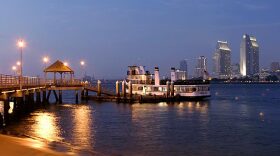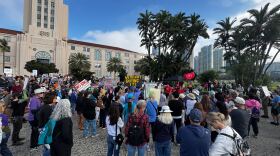Chinese army tanks were on the streets in the Tibetan capital Lhasa after angry protestors set fire to Chinese shops following a week of demonstrations that constituted the region's boldest challenge to Beijing's authority in nearly two decades.
A witness contacted by NPR described sporadic gunfire and violence directed against ethnic Chinese throughout Lhasa, the capital of Tibet, a formerly independent territory that was forcibly occupied by Chinese troops in 1951.
The witness said Tibetans were throwing stones at Chinese passers-by; the U.S. embassy in Beijing said American citizens in Lhasa have reported gunfire.
There were reports of at least two people killed in clashes between protestors and security forces, but there were no details or confirmation.
The Dalai Lama, Tibet's spirtual leader in exile, called on Beijing to refrain from using force against the protestors and to "address the long-simmering resentment of the Tibetan people." Beijing responded by accusing the Dalai Lama, who has lived in neighboring India since 1959, of "masterminding" the protests, according to the official Xinhua news agency.
The violence comes as the upcoming Beijing Olympics have placed renewed attention on China's control of Tibet. This week has brought global marches, organized to mark the 49th anniversary of a failed uprising against Communist rule that spilled into Tibet itself.
International rights groups said three major monasteries in and around Lhasa have been sealed off by the authorities in response to the demonstrations and violence.
One witness told The Associated Press that after a demonstration by hundreds of Buddhist monks on Friday, several monks were arrested and tanks were patrolling the square near the city's famous Potala Palace, once the residence of the Dalai Lama's residence.
The violence was the latest in a series of protests inside and outside Tibet that have put an unwelcome spotlight on China's policies in Tibet in the lead-up to this summer's Olympic Games in Beijing. Tibetan exiles have also held high-profile protests in northern India.
Beijing has ruled over Tibet with a heavy hand since it first occupied the Himalayan region, enforcing strict controls on religious institutions. China's government also vilifies the Dalai Lama, who has continued to call for Tibetan independence.
from NPR and wire reports.
Copyright 2022 NPR. To see more, visit https://www.npr.org. 9(MDAzMjM2NDYzMDEyMzc1Njk5NjAxNzY3OQ001))





